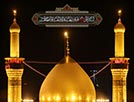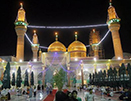Role of Shura and Bay’at
- Details
- Hits: 2719
Role of Shura and Bay’at
In this study we propose to deal with two questions namely consultation (Shura) and role of allegiance (Bay’at) briefly:
(1) Role of consultation
In Islam consultation has an important role in connection with social questions.
(a) Administrative affairs
In the Qur'an the holy Prophet was commanded:
"Hold consultation with them in regard to the conduct of affairs". (Surah Ale. Imran, 3:159).
Describing the characteristics of the believers the Qur'an says: "Whose affairs are a matter of counsel". (Surah al‑Shura, 42:38).
In the life account of the holy Prophet we find many instances of his consultation with his companions. For example, on the occasion of the Battle of Badr when he received the report that the caravan of Quraysh had escaped and was beyond the reach of the Muslims, and that the well‑equipped enemy had moved from Mecca with the intention to fight, he consulted his companions as to the action to be taken. It was with their consent that he decided to join the battle. He made consultations on the occasions of the Battle of Ohad and the Battle of the Ditch also. When Imam Husayn Ibn Ali (P), while on his way from Mecca to Kufah, received the report of the martyrdom of Muslim Ibn Aqeel he consulted his companions whether he should continue his journey.
From such evidence we learn that the management of government affairs and social questions should not be despotic and dictatorial.
(b) Election of the ruler
Certain Muslim sects are of the opinion that the election of a ruler (or Head of the State) is dependent on the voting of men of integrity, knowledge, virtue, and sound judgement. (al‑Ahkam al‑Sultaniyyah by Mawardi pp. 5 ‑ 6).
There is a difference of opinion as to the number of the voters necessary to form an electoral council. Some people (like Ahmad Ibn Hanbal) are of the view that a meeting of all men of opinion among the Muslim ummah is necessary. Others think that a meeting of a lesser number is also enough. According to a certain sect, the competent persons only nominate someone as a candidate for the caliphate, but the real factor in determining his election is the vote of the people. This sect regards the pledge of allegiance as a vote and considers the vote of the majority to be enough. (al‑Shakhsiyyah al‑Dawliyyah by Muhammad Kamil Yaqut p. 463).
Our comments in this connection are briefly as follows:
In those cases in which there is no special evidence that the holy Prophet designated a particular person to be the Head of the State, it is the general duty of the Muslim society to elect an eligible candidate to enforce the Islamic injunctions in the best possible manner. As a head of the state or ruler he must have certain qualifications. It is the duty of those who influence public opinion to introduce such persons to the masses and prevent the nomination of every Tom, Dick and Harry.
Secondly, none of the electoral councils held since the demise of the holy Prophet aimed at the introduction of a nominee. They were always held for the purpose of election and appointment. Thirdly the pledge of allegiance by all other people did not amount to election. That was only a proclamation of their loyalty to the ruler elected or appointed by the council.
(2) Role of the pledge of allegiance
The pledge of allegiance is a sort of covenant of loyalty and obedience which is concluded with a new ruler, or in certain cases it is a renewal of a covenant already existing. In the latter case it amounts to a vote of confidence in the government in power facing some extraordinary situation.
Usually the pledge of allegiance is accompanied by giving hand to the ruler in token of an undertaking to give him full support in all battles of life.
On several occasions on which the Muslims took the pledge of allegiance to the Prophet, the undertaking they gave was quite definite. At Aqabah the representatives of the people of Medina undertook to support him against his enemies in any battle anywhere.
A special undertaking was included in the text of the pledge taken at Hudaybiyah, known as Bay'at al‑Rizwan. (Surah al‑Fath, 48:18). The same was the case with the pledge taken by the immigrant women. (Surah al‑Mumtahina, 60:12).
Anyhow, though a pledge of allegiance concerns the government affairs, it has nothing to do with the appointment of a ruler. It only means the acknowledgement of his power and influence by the person taking the pledge, who declares his loyalty to the ruler concerned.
We know that Islam has emphatically enjoined adherence to all covenants in more than 30 verses of the Qur'an. To live up to one's commitments is necessary for the maintenance of one's good relations with others. All agreements, whether they are at the limited level of the individuals, or are concluded between the ummah and the rulers or between the Muslim society and other societies should be respected. Anyhow a pledge of allegiance should not be construed to mean that loyalty is obligatory in all conditions. There are two pre‑requisites of the validity of a pledge: Firstly it should have been taken under proper conditions; and secondly the ruler must be abiding by the Qur'an and the Sunnah, and must not personally have done anything to make him unfit for holding his office.
Loss of eligibility to rule
If a leader of congregational prayers loses his integrity, he is no longer fit to lead prayers. If the guardian of a minor becomes mentally unsound, he will be removed from guardianship by the authorities concerned. We have already said that a ruler must have certain qualifications. If he loses these qualifications, for example, he becomes lax in his faith in Islam, infringes Divine laws, misappropriates funds out of public treasury, or governs tyrannically, in all these cases he is no longer fit to be the Head of a Muslim State.
However, the deposition of a ruler being a very grave matter affecting the interests of the whole nation, it must be thoroughly discussed at the meeting of a general assembly and the final decision in this respect should be taken by competent persons only. Everybody cannot express his individual opinion on such a vital question. Some authorities are of the opinion that the question of the deposition of a ruler should be decided only by the Islamic Legislative Assembly after due deliberations. (al‑Shakhsiyyah al‑Dawliyyah by Muhammad Kamil Yaqut).
According to the Shi'ah doctrine, this question cannot arise during the government of the Imams designated to Imam by the holy Prophet. According to the Shi'ah view all Imams are infallible and immune from every sin and slip. Their position is above that of ordinary integrity and purity. Anyhow, this question can arise even for the Shi'ah during the occultation of the designated Imam. In any case, the purity and fitness of the ruler is a vital question in the social system of Islam, and it is a big social duty of the Muslims to keep a constant watch over the activities of the rulers.











